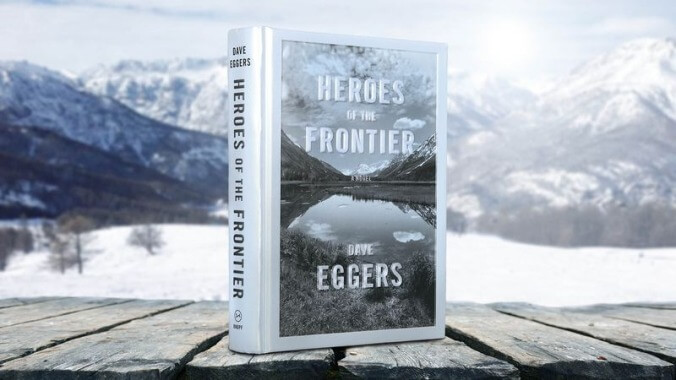Dave Eggers had me wondering through much of Heroes Of The Frontier whether or not Josie’s take on her life’s events is reliable. The narration of the book is not written in first person, but still presented from Josie’s perspective. She drinks an awful lot throughout the book, which calls into question how accurate her portrayal of the past and of others may be.
Chief among this ambiguity is Josie’s thoughts on Carl, the father of her children. She portrays him as a deadbeat—someone who does not fully commit to anything he does in life, be it his family, politics, or employment. He does, however, commit to a new woman, and I think it fair to wonder how much of Josie’s depiction of him (Carl is unseen to the reader through most of the book) is grounded in truth, and how much of is based in resentment over the way her life and their relationship unfolded. Though she truly may have gotten the proverbial shit end of the stick, she is, again, someone who is drinking relentlessly, while primarily out on the road with her children, so it’s likely her opinions are skewed by the hooch.
The first time I really started to wonder, though, was a present-day scene roughly halfway through the book, in which she encounters a man at a bar. She invites him over to sit with her, which he does awkwardly. Upon seeing some paperwork he has and hearing his comment about how far he has come, Josie becomes convinced he’s there to serve her papers, likely related to Carl or the lawsuit regarding her dental practice. It seems somewhat unlikely, but Josie creates a scene to draw attention to the man and slips out of the bar as he is accosted by some toughs. How much of Josie’s interpretation was true? How likely it was that the scenario only played out the way it did in Josie’s head?
But throughout the rest of the book, Josie gives us little reason to doubt the veracity of her stories. Sure, she often is drunk, and that is enough to raise an eyebrow, but Josie always seems open about her life. The narrator feels open with us about the details of her life. It all seems fairly honest—just a little drunk.
Then, late in Heroes Of The Frontier, Josie finally makes a call home to Carl—a call that seems inevitable at some point, a Chekhov’s gun. When she reaches him, we learn that maybe Carl is not as bad as she has portrayed him. He seems jovial, for the most part, and it turns out he was not behind any papers being served—if that man indeed was there to serve her papers—and it was more likely related to another case in which she signed on as a plaintiff, only to find the defendant was counter-suing anyone whose name was on it. At the same time, Carl seems disinterested in much of Josie’s situation, as noted by the fact that he never even asks to speak to the children. He seems unworried and uncaring, but his faults also may have been exaggerated. Carl’s reality is likely somewhere in the middle.
The other climactic element of Heroes Of The Frontier is the one-two punch of Josie rounding up a hired band of musicians to help her realize the music going through her head the whole trip. In that session, she hears and is moved by the soundtrack that is her life. Immediately following this scene, Josie learns the area is beset with wildfires heading their direction, and those fires ultimately take with them the cabin in which she and the children have been squatting for some time, their money burning up with their shelter.
Then, Josie and her children flee through the woods on foot during a violent storm, the cacophony of the thunder and lighting creating a soundtrack to this moment. Up until this point, they have been just missed by a series of potential dangers—a band of prisoners coming onto the RV, a wall of fire, an angry landlord chasing them off. This is the first time we see them facing danger head on, and making it through to the other side is the first glimpse of Josie feeling alive and happy to be sharing that moment with her children.
The storm itself seems to be saying something about life and family perils, navigating difficult times, ending up a little worse for wear but coming out the other side better for it. It teases death, that high of realizing you’re still alive. But then Eggers takes it one step further, and in a single-line final chapter, he poses, “But then there is tomorrow.” It’s equally ominous as it is hopeful. If this is the pivotal moment, the feeling of being alive that the trio has just experienced together, what happens next? Is that is? Is there more? Will Josie be happier following the experience? Can she ever reclaim the same feeling? What will become of her children? And—as the high prices of Alaska becomes a recurring topic in Heroes Of The Frontier—at what cost was that moment achieved?

